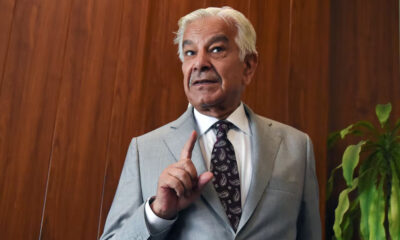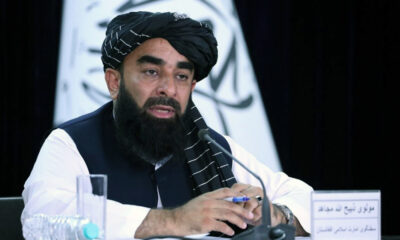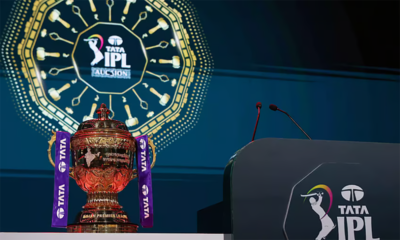Regional
Pakistan launches strikes inside Iran against militant targets
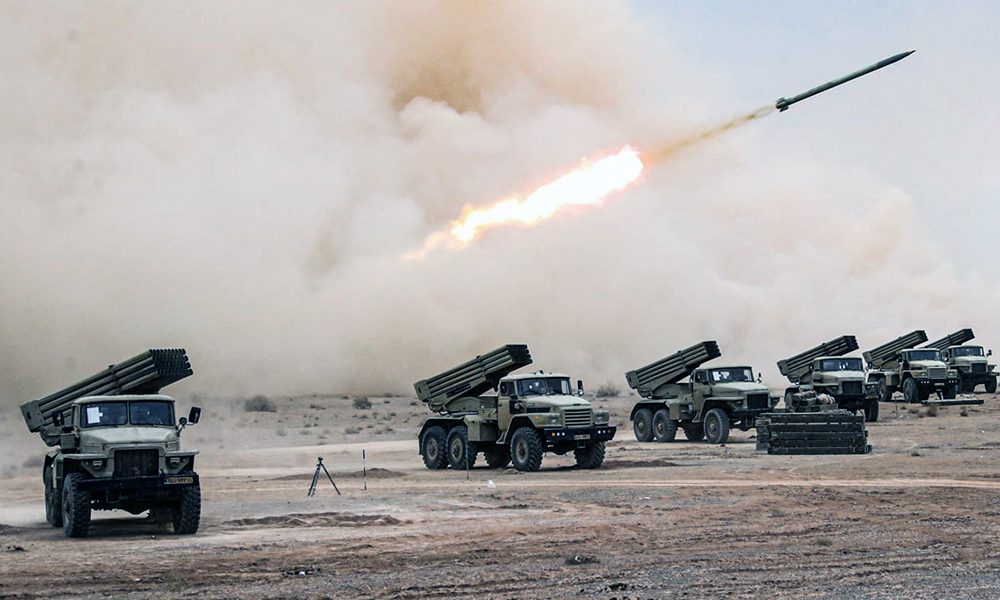
Pakistan conducted strikes inside Iran on Thursday, targeting separatist militants, the Pakistani foreign ministry said, two days after Tehran said it attacked Israel-linked militant bases inside Pakistani territory, Reuters reported.
Iranian media said several missiles hit a village in the Sistan-Baluchistan province that borders Pakistan, killing three women and four children, all non-Iranians.
“A number of terrorists were killed during the intelligence-based operation,” the Pakistani ministry said in a statement, describing it as a “series of highly coordinated and specifically targeted precision military strikes against terrorist hideouts”.
It added, “Pakistan fully respects the sovereignty and territorial integrity of the Islamic Republic of Iran.
“The sole objective of today’s act was in pursuit of Pakistan’s own security and national interest, which is paramount and cannot be compromised.”
A Pakistani intelligence source told Reuters the strikes were carried out by military aircraft, read the report.
“Our forces have conducted strikes to target Baloch militants inside Iran,” the intelligence official in Islamabad, the Pakistani capital, said.
“The targeted militants belong to BLF,” he added, referring to the Balochistan Liberation Front, which seeks independence for Pakistan’s Balochistan province.
Iran said on Tuesday it had targeted Israel-linked militant bases inside Pakistan. Pakistan said civilians had been hit and two children killed, warning of consequences for which Tehran would be responsible.
Islamabad recalled its ambassador from Iran on Wednesday, Reuters reported.
Pakistan and Iran have in the past had rocky relations, but the strikes are the highest-profile cross-border intrusion in recent years.
Pakistan recalls envoy from Iran after ‘unprovoked’ missile strikes
Pakistan recalled its ambassador from neighbouring Iran on Wednesday to protest at a “blatant breach” of its sovereignty after Tehran said it launched missile attacks on militant bases in southwestern Pakistan.
Iran’s foreign minister said it hit militants in “missile and drone” strikes. State media said Iranian missiles struck two bases of the Sunni Muslim group Jaish al-Adl, designated a “foreign terrorist organisation” by the U.S. State Department.
Nuclear-armed Pakistan said a violation of its airspace resulted in the deaths of two children but has not confirmed the nature of the violation, or the location of the strikes.
Only militants were hit, Iranian Foreign Minister Hossein Amirabdollahian said in Davos, Switzerland, where he was attending the World Economic Forum, alleging those attacked were linked to Israel, read the report.
Pakistan and Iran have in the past had rocky relations, but the strikes are the highest-profile cross-border intrusion in recent years.
The strikes were launched a day after similar attacks carried out by Tehran inside other neighbours, Iraq and Syria. Baghdad recalled its ambassador from Tehran after Iran’s state-backed media said it had hit an Israeli espionage centre.
Provincial officials in Pakistan said two children were killed and several others injured in strikes near the Iran border.
The violation was unprovoked and unacceptable, said Pakistani foreign ministry spokeswoman, Mumtaz Zahra Baloch. Pakistan reserved “the right to respond to this illegal act”, a message it had conveyed to the Iranian government, she said.
Pakistan would not allow Iran’s ambassador, currently visiting his home country, to return, Baloch said.
A joint border trade committee meeting had been canceled, and a Pakistani trade delegation had been recalled from Chabahar in Iran, said government official Aurangzeb Badini.
“Further escalation is possible, though Islamabad has strong incentives to be cautious,” said Michael Kugelman, director of the Wilson Center’s South Asia Institute, adding that Beijing might also step in to help mediate.
“China has close ties to both Iran and Pakistan, and it has a strong interest in the crisis not spiraling out of control …it will likely quietly press the two sides to step back from the brink” he said.
Jaish al-Adl has in the past mounted attacks on Iranian security forces in the border area with Pakistan.
Officials in Pakistan’s southwestern province of Balochistan, which borders Iran, said that four missiles had hit the Panjgur district close to the border.
“Four missiles were fired in the village of Koh-i-Sabaz which is around 50 km (31 miles) inside Pakistan soil,” a senior official of the Panjgur administration told Reuters.
“A mosque and three houses were damaged in the attack,” another official said, adding that two young girls were killed and three other people injured.
Jaish al-Adl, which says it seeks greater rights and better living conditions for ethnic minority Baluchis, has claimed responsibility for several attacks in recent years on Iranian security forces in Iran’s southeastern province of Sistan-Baluchestan.
In its previous iteration as Jundallah, the group had pledged allegiance to Iraq- and Syria-based jihadist group the Islamic State.
Iran’s Amirabdollahian had a phone call with his Pakistani counterpart Jalil Abbas Jilani, according to an Iranian foreign ministry statement, and stressed Tehran’s respect for Pakistan’s sovereignty, Reuters reported.
“Iran’s security has been repeatedly targeted by Jaish al- Adl terrorist group from Pakistani soil and we are hopeful that stronger security cooperation between the two countries continue,” Amirabdollahian said.
Regional
Pakistan agrees to $4 billion arms deal with Libyan National Army
The package reportedly includes air, land and naval equipment and may involve the sale of JF-17 fighter jets and Super Mushak trainer aircraft to Libya.

Pakistan has reached a military equipment deal worth more than $4 billion with Libya’s eastern-based Libyan National Army (LNA), Pakistani officials said, despite a long-standing United Nations arms embargo on the country.
The agreement was finalised following a recent meeting in Benghazi between Pakistan’s Army Chief, Field Marshal Asim Munir, and Saddam Khalifa Haftar, the LNA’s deputy commander-in-chief. Officials said the deal will be implemented over about two and a half years, Reuters reported.
According to officials familiar with the agreement, the package includes air, land and naval equipment and may involve the sale of JF-17 fighter jets and Super Mushak trainer aircraft. Estimates of the deal’s value range between $4 billion and $4.6 billion, making it one of Pakistan’s largest-ever defence exports.
The LNA confirmed entering a defence cooperation pact with Pakistan, covering weapons sales, training and military manufacturing, though it did not provide details. Haftar described the agreement as the start of a “new phase of strategic military cooperation.”
Libya has been under a UN arms embargo since 2011, requiring international approval for weapons transfers. It remains unclear whether exemptions have been sought. Pakistani officials said the deal does not violate UN restrictions, noting that several countries continue to engage militarily with Libyan factions.
Pakistan has been actively expanding its defence exports, promoting its domestically produced and China co-developed JF-17 fighter as a lower-cost alternative to Western aircraft.
The Libya agreement would mark a significant expansion of Pakistan’s defence footprint in North Africa amid growing international competition for influence in the country.
Regional
Imran Khan calls for street movement, urges public to reclaim rights
Khan has appealed for collective action, saying the movement was necessary to restore the rule of law, ensure justice, and end what he described as politically motivated and pre-determined court decisions.

Former Pakistani Prime Minister Imran Khan has called on his supporters and the wider public to prepare for a nationwide street movement, urging citizens to rise in defense of their fundamental rights.
In a message issued from Adiala Jail, where he is currently detained, Khan appealed for collective action, saying the movement was necessary to restore the rule of law, ensure justice, and end what he described as politically motivated and pre-determined court decisions.
Khan said the recent verdict against him was part of sustained political pressure, alleging that the ruling was delivered without due legal process and without giving him a fair opportunity to present his defense. He warned that such practices have severely damaged the credibility of Pakistan’s judicial system.
The former prime minister also called on lawyers, constitutional experts, and members of the legal community to stand with the public and play an active role in safeguarding the Constitution and the rule of law. He said political stability and economic progress were impossible without an independent and impartial judiciary.
Addressing civil-military relations, Khan said his criticism was aimed at individuals rather than institutions. He described the military as belonging to the people of Pakistan, while alleging that actions taken against him in detention were carried out on the instructions of military authorities.
Khan drew comparisons with the 2007 political crisis, warning that continued erosion of the rule of law would have lasting consequences for the country. He praised judges who resist pressure as national heroes and criticized those who, he said, follow orders without question.
The statement comes amid heightened political and judicial tensions in Pakistan, with Khan’s trial and detention continuing to draw strong domestic and international attention.
Regional
Pakistan court hands Imran Khan, wife 17-year jail terms in another graft case
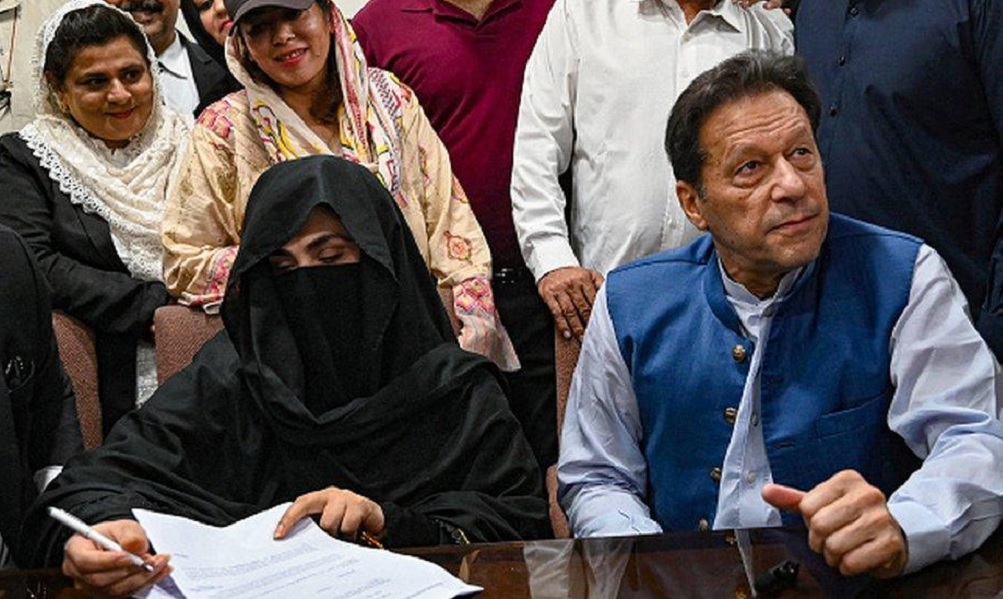
A Pakistani court on Saturday sentenced former Prime Minister Imran Khan and his wife Bushra Bibi to 17 years in prison each in a corruption case involving the under-priced purchase of luxury state gifts, the court and Khan’s lawyers said.
The latest conviction adds to a series of legal troubles for Khan, who has been behind bars since August 2023, and is currently serving a 14-year sentence in a separate land graft case, Reuters reported.
He faces dozens of cases filed since he was ousted from office in 2022, ranging from corruption to anti-terrorism and state secrets charges. Khan has denied wrongdoing in all the cases, which his party says are politically motivated.
“The court announced the sentence without hearing the defence and sentenced 17 years imprisonment to Imran Khan and Bushra Bibi with heavy fines,” Khan’s family lawyer Rana Mudassar Umer told Reuters.
They were handed 10 years’ rigorous imprisonment under Pakistan’s penal code for criminal breach of trust and a further seven years under anti-corruption laws, the special court of Pakistan’s Federal Investigation Agency said in its verdict.
He faces dozens of cases filed since he was ousted from office in 2022, ranging from corruption to anti-terrorism and state secrets charges. Khan has denied wrongdoing in all the cases, which his party says are politically motivated.
“The court announced the sentence without hearing the defence and sentenced 17 years imprisonment to Imran Khan and Bushra Bibi with heavy fines,” Khan’s family lawyer Rana Mudassar Umer told Reuters.
They were handed 10 years’ rigorous imprisonment under Pakistan’s penal code for criminal breach of trust and a further seven years under anti-corruption laws, the special court of Pakistan’s Federal Investigation Agency said in its verdict.
Khan’s jail term from Saturday’s ruling would begin after he has served the 14 years from the land graft case, Information Minister Attaullah Tarar said.
The case relates to luxury watches gifted to Khan by Saudi Arabia’s Crown Prince Mohammed bin Salman during official visits, which prosecutors said Khan and his wife then purchased from the state at a heavily discounted price in violation of Pakistan’s gift rules.
Tarrar said the purchase resulted in losses of several million rupees for the state.
Zulfi Bukhari, a spokesperson for Khan, said the verdict “ignores basic principles of justice” and turns the process into “a tool for selective prosecution.”
Khan has told his legal team to appeal the decision at the Islamabad High Court, Salman Safdar, another one of his lawyers, told reporters outside the jail where the trials were being held, Geo News reported.
ANOTHER STATE GIFTS CONVICTION
The case is separate from an earlier state gifts prosecution linked to Khan’s August 2023 arrest. Earlier sentences of 14 years for Khan and seven years for Bushra Bibi were later suspended on appeal. The couple denies wrongdoing.
The cases are commonly known in Pakistan as the Toshakhana cases, referring to the state repository where gifts received by public officials are deposited.
Following the verdict, Khan’s Pakistan Tehreek-e-Insaf (PTI) party announced plans for protests across Punjab on Sunday.
Khan’s party also says routine family and legal visits have been blocked in recent weeks despite court orders. Authorities deny any mistreatment and say he is receiving all facilities available to prisoners.
Khan, a former cricket star turned politician, remains one of Pakistan’s most polarising figures, with his legal battles unfolding as his Pakistan Tehreek-e-Insaf party remains sidelined from power.
-

 Latest News1 day ago
Latest News1 day agoAfghanistan exports 10 containers of batteries to Saudi Arabia and UAE for first time
-

 Latest News2 days ago
Latest News2 days agoPakistani cleric condemns lifetime immunity for Army Chief as un-Islamic
-

 Latest News4 days ago
Latest News4 days agoAfghanistan signs 30-year deal for marble mining in Daikundi
-

 Latest News5 days ago
Latest News5 days agoPakistan summons Afghan diplomat over deadly attack in North Waziristan
-

 Latest News4 days ago
Latest News4 days agoAfghan health minister calls for medical cooperation between Kabul and New Delhi
-

 Latest News5 days ago
Latest News5 days agoKarzai urges reopening of girls’ schools and universities for Afghanistan’s bright future
-
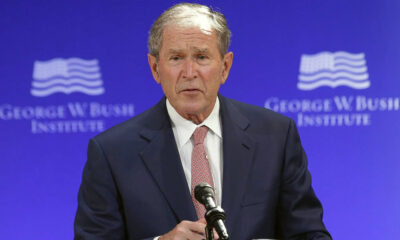
 Latest News4 days ago
Latest News4 days agoBush Institute criticizes Trump administration’s Afghan immigration freeze
-

 International Sports2 days ago
International Sports2 days agoAriana News to broadcast key AFC Champions League Two clash






